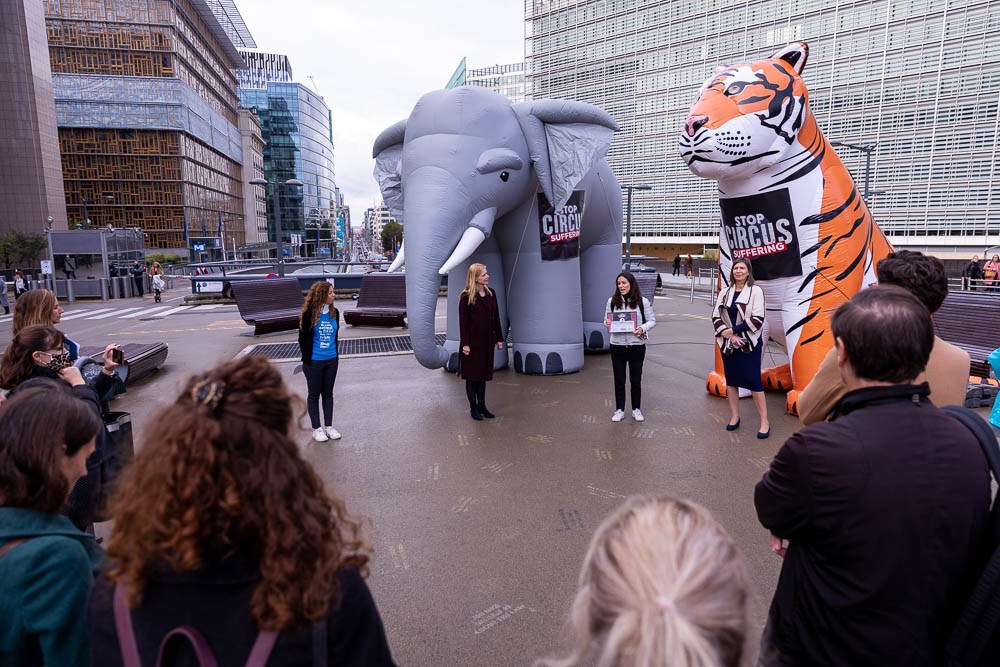The European Commission told the European Parliament at a plenary hearing on Thursday that banning the use of wild animals in circuses is a member state competency.
A majority of EU member states have already adopted national legislation restricting the use of either all, or exclusively wild, animals in circuses, reflecting the public’s position on ethical and animal welfare grounds. However, France, Germany, Italy and Spain do not have any national restrictions and Czech Republic, Finland and Hungary have only adopted restrictions on the use of some species of wild animals.
As previously reported, the Stop Circus Suffering campaign has collected one million signatories demanding an EU-wide ban on the use of wild animals in circuses. Despite wide-spread support for the such a ban in the Parliament, the Commission position is still non-committal and in contrast to the parliament’s demand for legislation.
The European Commission was asked to respond to the following question:
“Does the Commission intend to introduce a ban on the use of wild circus animals in the EU in order to ensure that the exposure to the risks of the illegal wildlife trade and risks to public health and security are uniformly mitigated across the Member States and to assist with the enforcement of national restrictions for the majority of Member States that already apply them?”
In his reply (16 December), Janez Lenarcic, Commissioner for Crisis Management, admitted that the use of wild animals raises issues of concern around animal welfare and ethics but pointed out that the vast majority of member states had already introduced a total or partial ban on the use of wild animals in circuses in their territories.
The Commission is of the opinion that any question on the banning of wild animals kept in circuses should not be decided at the Union level, but rather should be left to the member states. This is in line with the principles of subsidiarity and proportionality, he said. He also noted that there are rules at EU level that govern the movement of these animals between member states.
Importing them into and moving them around the EU is strictly regulated. In the case of circuses, the relevant certificates can only be issued to animals that have been legally acquired and have been born and bred in captivity. This makes it possible to carry out checks in the few remaining member states that still allow the use of wild animals in circuses and clearly limits the risk of illegal wildlife trade.
His reply did not satisfy the MEPs who claimed that, on the contrary, the fact that a full or partial ban exist in 23 member states actually is an argument to move to a full EU-wide ban. According to many MEPs, the Commission cannot hide behind an alleged lack of competency. When there is a clear need for legislation, the Commission usually does not hesitate to act.
In circuses, wild animals are not only imprisoned and forced to behave unnaturally, they also pose a threat when it comes to the risk of disease transmission and to accidents which impact trainers and public. The use of endangered species could fuel their illegal trade.
“It’s crucial that the EU provides a harmonised and effective solution to this cruel practice and does not avoid its responsibility,” commented Morgane Le Dréau, Wild Animals Policy Coordinator at FOUR PAWS.
“The EU is competent to deal with this matter as travelling circuses are considered a service, according to the Services Directive and provisions of Article 114 of the EU treaty gives to the EU legislator the competence to act with regard to the free movement of services.”
"We are disappointed with the decision taken today by the European Commission following the Parliament's call for the introduction of an EU-wide ban on the use of wild animals in circuses,” said Italian MEP Evi (Greens/EFA), Vice-President of the Intergroup on Animal Welfare of the European Parliament and herself from a country which currently has no ban.
“The Commission has ignored the appeal of over 1 million citizens who signed a petition to say no more to this unnecessary suffering. The EU has the competence to act and the moral obligation to do so.”
"We are talking about animals that should live free in nature, not kept in conditions that ignore their ethological needs, constantly transported from one state to another in cramped cages and trained through physical punishment. The time has come to put an end to this barbarism, which has no place in the 21st century.”
“We welcome the strong cross-party support from the parliament and the call for the Commission to not hide behind a lack of competence as several grounds could be used to enact a ban. We will not stop our efforts until the Commission acts to safeguard all the wild animals currently trapped for ‘entertainment’, commented Reineke Hameleers, CEO, Eurogroup for Animals.
Last week, a Dutch animal advocacy NGO which operates a sanctuary in Portugal signed a contract with the authorities to rescue almost all of the remaining wild animals from Portuguese circuses. Portugal’s national ban on the use of wild animals in circuses, enacted in 2018, will enter into full force in 2024. To aid the enforcement, the NGO offered suitable rescue solutions for the animals.
The Brussels Times

